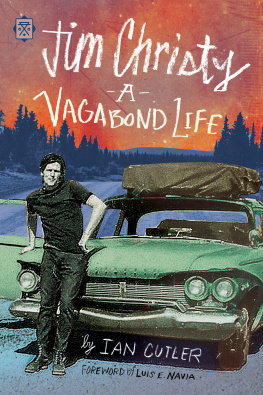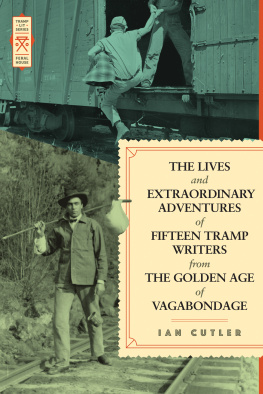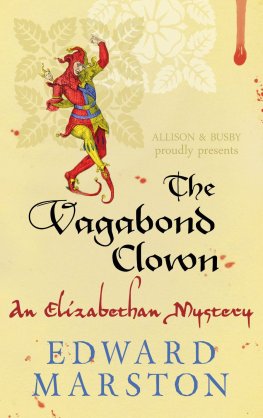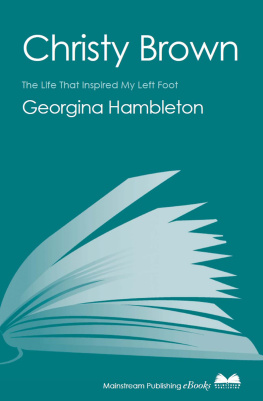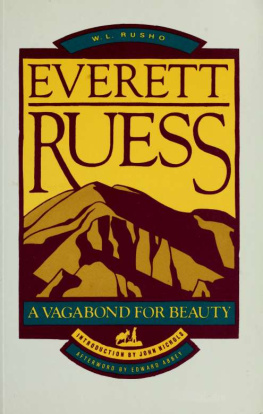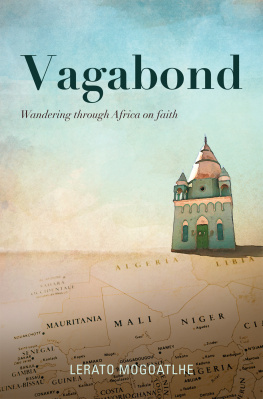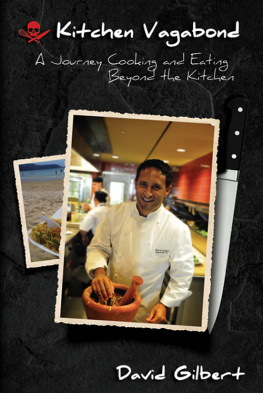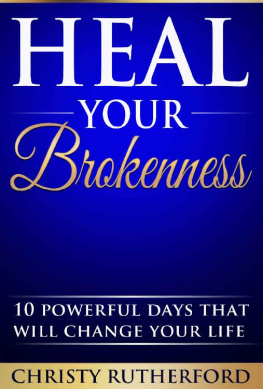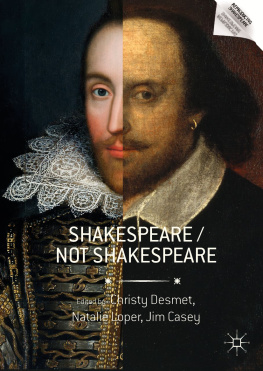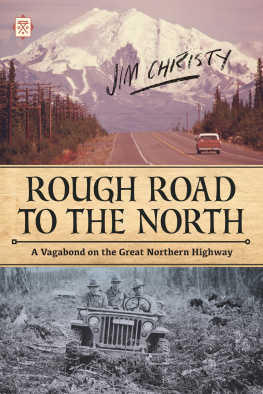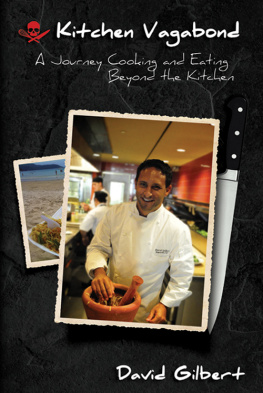Ian Cutler - Jim Christy: A Vagabond Life
Here you can read online Ian Cutler - Jim Christy: A Vagabond Life full text of the book (entire story) in english for free. Download pdf and epub, get meaning, cover and reviews about this ebook. year: 2019, publisher: Feral House, genre: Non-fiction / History. Description of the work, (preface) as well as reviews are available. Best literature library LitArk.com created for fans of good reading and offers a wide selection of genres:
Romance novel
Science fiction
Adventure
Detective
Science
History
Home and family
Prose
Art
Politics
Computer
Non-fiction
Religion
Business
Children
Humor
Choose a favorite category and find really read worthwhile books. Enjoy immersion in the world of imagination, feel the emotions of the characters or learn something new for yourself, make an fascinating discovery.
- Book:Jim Christy: A Vagabond Life
- Author:
- Publisher:Feral House
- Genre:
- Year:2019
- Rating:4 / 5
- Favourites:Add to favourites
- Your mark:
- 80
- 1
- 2
- 3
- 4
- 5
Jim Christy: A Vagabond Life: summary, description and annotation
We offer to read an annotation, description, summary or preface (depends on what the author of the book "Jim Christy: A Vagabond Life" wrote himself). If you haven't found the necessary information about the book — write in the comments, we will try to find it.
Ian Cutler: author's other books
Who wrote Jim Christy: A Vagabond Life? Find out the surname, the name of the author of the book and a list of all author's works by series.
Jim Christy: A Vagabond Life — read online for free the complete book (whole text) full work
Below is the text of the book, divided by pages. System saving the place of the last page read, allows you to conveniently read the book "Jim Christy: A Vagabond Life" online for free, without having to search again every time where you left off. Put a bookmark, and you can go to the page where you finished reading at any time.
Font size:
Interval:
Bookmark:

JIM CHRISTY
A VAGABOND LIFE

IAN CUTLER

FERAL HOUSE
For
JIM CHRISTY
and
VAGABONDS
EVERYWHERE
CONTENTS
FOREWORD BY LUIS E. NAVIA
T he only way to truly learn from a philosopher is to recall the way he or she lived. Actions are the definitive measure of the effort that has been made. That is, the effort to shed light on the uncertain road ahead, in an earnest attempt to help others make their way through an otherwise dark world.
When I first met Ian Cutler more than a decade ago, our common thread was Diogenes of Sinope, the ancient Greek Cynic who chose to live in a tub and carried a lantern in search of an honest man. We shared an affinity then, as we do now, for the Cynic sensibility and a steadfast belief in its capacity to improve the human condition, today more than ever.
For the Cynics, the daily battle they waged was with the smoky haze known as typhos, a madness that permeates human existence, confuses the mind, and withers the soul. Overcoming it requires acknowledging its presence and raging against it, each in our own way, but ultimately, with the end goal of living a life in accordance with nature. Futile as such an endeavor may feel, and seemingly insignificant in a rapidly changing, unnatural landscape, it is the attempt made to attain absolute freedomthe most difficult of featsthat ultimately matters.
Jim Christy understood this. He recognized the cloud for what it is and made a choice: remain chained and forever delayed or go wandering in search of happiness now. So he opted for the latter. Christy felt an urgency to be human, to do better, to embrace the present, that he could not ignore.
What lies ahead is the story of a tramp-writer and modern-day Cynic who has lived his life in pursuit of the unexpected and, along the way, created a body of work on par with the adventure. Christy writes in the same manner that he has lived: compelled by wanderlust, guided by instinct, and ruled by no one. It is art that defies convention by an artist who lacks pretense.
Ian Cutlers biography of Christy is a carefully composed and painstakingly researched celebration of the global ramblers adventures and the legacy of vagabond literature to which he rightfully belongs. Excerpts from Christys poetry and prose, including unpublished works, bring the chronology to life. The result is an effortless, fascinating read and a stirring homage to tramp-writers. No surprise then that by the end it feels as if we have only just begun.
That, of course, is Cutlers intention. His passion for sharing his subject with a wider audience is palpable. In Christy he has found a vagabond-philosopher, determined to live free in a hostile world, who has spent a lifetime recording the journey. Through Christys example, we are inspired to look closer at what it means to be human; through his writings, we can experience it first-hand through the eyes of a seasoned tramp.
Luis E. Navia is Professor of Philosophy at New York Institute of Technology. His books include Socrates: A Life Examined and Diogenes of Sinope: The Man in the Tub.
PROLOGUE
B y the time Jim Christy had read Jack Kerouacs 1957 novel On the Road, at the age of seventeendiscovering in that defining moment both his tribe and his love of literatureChristy was already an experienced road kid. He had embarked on several lone adventures including, just prior to his thirteenth birthday, a ten-week tramp from his home in South Philadelphia to the Canadian border and back. Such early impulses were the result of a certain malady common to all tramps-of-choice (as distinct from tramps-of-necessity) the world over, a human condition frequently referred to as wanderlust: an involuntary lure of the alien and the exotic that could be regarded as the reverse of homesicknessChristy was sick at heart to see the world.
On the Road may have been an affirmation to Christy of his own strange and unconventional yearnings, but he did not need a mentor in the art of vagabondage. Christy had always been an individual, refusing to embrace convention for the sake of fitting in, choosing instead the freedom to define his own identity. This individualism was also accompanied by cosmopolitan instincts, a sovereignty of spirit that left Christy feeling alien everywhere but claiming everywhere as his home. But in spite of a flirtation with anarchism in which Christy read widely on the subject, including Emma Goldmans Living My Life three times, this rebel against modern life had no interest in changing the world or creating Utopias. His was a private, not a public, protest, an escape from the burden and banality of mainstream societys expectations and obligations.
In this sense, tramping or vagabondage (from the Latin vagari, to wander), is no more than a personal strategy for survival in a hostile world created by certain other humans. But Christy has always been in good company, attracted to other fugitives and self-exiles from tedious uniformity: hobos, vagabond artists and musicians, conscientious objectors, carnival freaks, rogues, and reprobates from all layers of society. A poem by Christy published in 2013 shows that his own feelings of alienation from the human world had very early beginnings indeed. Ready or Not reflects the same sentiments as those of one of Samuel Becketts fictional tramps in The Unnamable when, at the point of leaving his mothers womb he announces, I am being given, if I may venture the expression, birth into death. Christys contribution is as follows:
READY OR NOT
No, no! Stop!
Mama, Mama, please dont
Scream. Stop pushing, relax.
Eat ice cream. Nibble a pickle.
Get even fatter. I like it like
That. Like this. My current
Residence; its perfect. Couldnt
Be beat. Plenty to eat here. Warm.
No worries. No job. No teachers.
No unemployment lines. No
Rejection letters or fist fights
In alleys at the back of bars.
No angry lovers, no bad music.
Ive even gotten used to Fathers
Weekly thrusts. So, mama, please
Please get up from the Joe Weider
Incline Bench, your birthing chair
Of choice. Birth me not, Mama
Stop that pushing this instant.
No more of that screaming. I wish
To stay right here
In a cozy ball.
Cant you understand that,
Mama?
Shit.
Here we go.
And oh, its cold.
And our screams are one,
Mama.
(Jim Christy, This Cockeyed World)
But Christys real forebears were those tramp-writers born during the late 1800s who influenced Kerouac in the first place. In this respect, the writing and the life of Jim Christy, born James Christinzio on July 14, 1945, presents us with the conundrum of a Victorian vagabond adventurer born seventy years too late. Christy even missed out on participating in the world described in Kerouacs writings that first identified to the young hobo he was not unique in his unconventional response to the world. And so, within the wider classification of societal misfits, Christy may well be one of the last representatives of that rare and much overlooked tradition, the tramp or vagabond writer.
It is understandable that during the financial crashes and associated depressions of 1873, 1893, and 1930, armies of tramps-of-necessity took to the road out of desperation to find work or simply survive. However, during this same period, a small but significant number of individuals deliberately exiled themselves from mainstream society simply out of a lifestyle choice. At a time when many of us are again questioning whether the acquisition of material possessions give our lives any real meaning, there is much we can learn from the spirit of these tramp-writers about surviving in the world today. One of the underlying questions posed by the life choices of Christy and his predecessors is: What possessed adults and teenagers, many from comfortable, even middle-class, homes, not only to abandon their families and communities for a life on the road in the first place, but also to commit their adventures and philosophy to print? When a friend of Christys, Daniel Zeleniouk, recently asked him, Jim, howd you get interested in books and writing? he got the now predictable answer, Well, I didnt read much until I was in my late teens when I picked up a book called
Next pageFont size:
Interval:
Bookmark:
Similar books «Jim Christy: A Vagabond Life»
Look at similar books to Jim Christy: A Vagabond Life. We have selected literature similar in name and meaning in the hope of providing readers with more options to find new, interesting, not yet read works.
Discussion, reviews of the book Jim Christy: A Vagabond Life and just readers' own opinions. Leave your comments, write what you think about the work, its meaning or the main characters. Specify what exactly you liked and what you didn't like, and why you think so.

